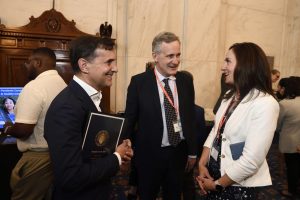
More than 500 delegates, legislators, congressional staffers, and representatives from government agencies gathered after work on June 7 to see firsthand a slice of the federally funded research and programming at Johns Hopkins University.
The biennial event, Hopkins on the Hill, took place at the historic Kennedy Caucus Room of the Russell Senate Office Building on Capitol Hill. Government officials mingled with scientists and meandered among various informative displays, from the rotorcraft-lander, Dragonfly, set to explore Saturn’s largest moon, to the telehealth app CurieDx, which can diagnose strep throat and a urinary tract infection with a mere selfie.
Denis Wirtz, who grew up and attended school in Belgium and is now the vice provost for research at JHU and an expert in the molecular and biophysical mechanisms of cell motility, agrees. “There are many aspects of the American university that remain the envy of the world, and with Hopkins being by far the largest recipient of federal funding, we have a special duty to address the needs of the nation, and we take that commitment seriously,” Wirtz said.
“Every penny [of the federal money Hopkins receives] is fought for with sweat and tears, and underneath that visible part of the iceberg is a lot of rejections,” he said, referring to the highly competitive process of applying for and receiving a federal grant. “We compete in an open field, with every university getting the same opportunity.”
For Wirtz, the event embodies the sea change that has occurred in academia in recent years, with universities and colleges—especially JHU—moving away from notions of higher education as something removed from everyday life. “Hopkins is not and never has been an Ivory Tower,” Wirtz said. “It might be a private institution, but it’s an urban campus and a university in the work of public service.”